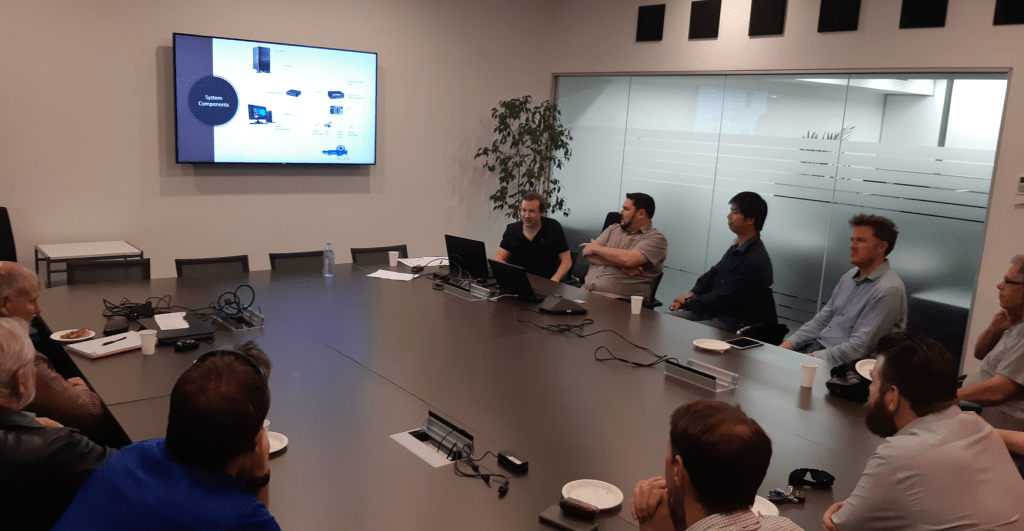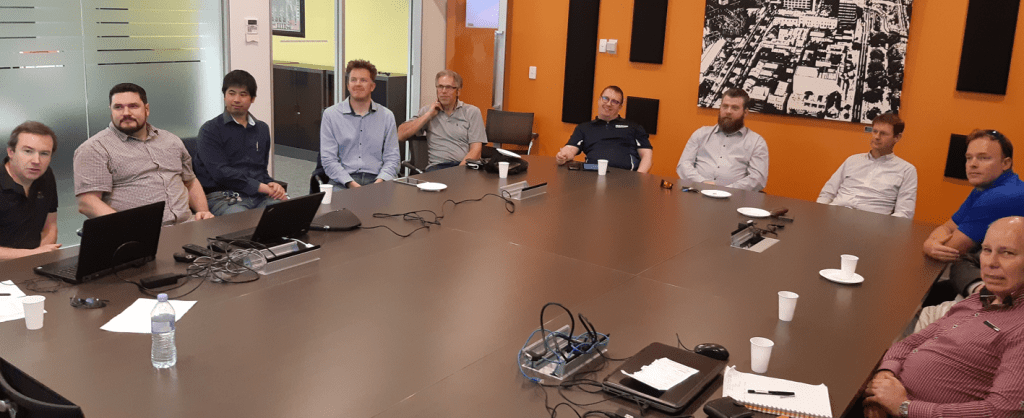Six things I learnt from the Melbourne LabVIEW User Group in 2019
Wired-in Software organises the quarterly LabVIEW User Group meetup in Melbourne, and has done so for the past 5 years. Here are six things I’ve learnt from hosting our user group this year
1) Broadcasting is the future of user groups
People go to great effort to prepare a presentation, so to only present to a handful is sometimes a shame. This year, we trialled Skype Broadcast to stream our presentations. The benefits of Skype broadcast included dual video and presentation sharing, no extra charge with our current tools, and anyone can view the link. The downside was that the screen sharing was not possible and there were some quirky aspects to the broadcast (seems to have a mind of its own by regularly muting the microphone unbeknownst to us). I was able to work around the no screen sharing aspect by using Xsplit Broadcaster (which is a video device simulator that publishes the desktop). To view the events, click on the Episode links in the 6th point below.
Action: In 2020 we’ll give Microsoft Teams Live events a go. I believe Skype Broadcast is becoming obsolete.
2) Location matters
In the 3rd and 4th events for 2019, we hosted it in the LabVIEW “hotseat” of Melbourne – Clayton. Several corporations in the neighbourhood are LabVIEW users, so hosting it here made it easier for a lot of people to get to. We had our highest attendance of 20 people attend in September. I would love to see this number becoming the norm.
Action: Survey attendees (past and present) for ideal location and times.
3) Regular Melbourne LabVIEW User Group meetings matter
We have steadily hosted 4 meetings a year for the past 2-3 years now. I think the regularity is important. People are coming to expect a meeting. People may not be available for every one, but they know that if they miss one, there’s another coming in 3 months time. The trick will be identifying the best time that suits the attendees. Our numbers ranged from 8 to 20 people this year. (The most we’ve ever had was 25 in March 2018). As you’ll see in my final point below, it hasn’t been too hard to find regular content. This year, we hope to continue with hosting 4 sessions a year.
Action: Plan out the next 4 meetings for 2020 by end of Jan. Survey attendees for content they would like to learn about, and if they would consider doing a presentation.
4) Communities matter
Our community is small judging by the attendance. However I believe more people are out there (at the time of writing, we have 90 people on our NI Community page) and would get value from our meetups. It’s just either they can’t make it, live too far away, or have other priorities. I think the prospect of the LabVIEW Community Edition in 2020 will bring new people out of the woodwork. People will be experimenting with LabVIEW more, and it will no longer be available to the privelaged.
Actions: Survey attendees to help us identify better time/locations, and more targeted content. We hope to host at new locations around Melbourne. We’ll also look to invite a LabVIEW champion to present remotely.
5) PR for the Melbourne LabVIEW User Group needs a boost
It was a challenge keeping up the PR about the events throughout 2019. The process was fairly ad hoc at best. We have the NI community page (which many users may not have notifications turned on), and then we have a Mailchimp email list for people who are interested but aren’t on the NI Community. This is cumbersome and difficult to manage.
Action: Find a better way to keep everyone up to date about the User Group. Talk to other User Group managers to find out how they go about this.
6) People have a great story to tell.
We had a great mix of people to present this year. Some people I had to nudge a bit, others offered without me even having to ask. But they all had a great story to tell. Engineers aren’t known for willingly getting up and speaking in front of a crowd to present, but when they do – they do it really well and tell a great story. I’ve learnt a lot from our presenters this year. Here’s a rundown of our presentations in 2019:
– In Episode 1 (hosted by Cochlear in East Melboure) Kim Bentley from Wired-in Software took us through a novel application that had to draw a large array of circles (that represented test samples). The circles had to change colours to indicate status, and also update the writing internally within each circle. LabVIEW art!! Following Kim, Kevin Dowsey from Adept-Turnkey showed us how powerful the LMI Gocator is – what a device! Then I finished it up and demonstrated how we could talk to the Gocator with LabVIEW.
– In Episode 2 (at Cochlear again) we experimented with Skype Broadcaster for the first time. This episode was just after NI Week, so it had all of the latest info fresh from NI Week. Gerrald Mateo from National Instruments gave us a rundown of the week’s big announcements, and then John Symonds from Wired-in Software demonstrated LabVIEW 2019 and some of its new features. It was good to see this first hand. I could already see some cool features I would be putting to use very soon.
– In Episode 3 (this time hosted at Braemac), we had Jono Mitchell and Michael Dyson from Braemac talk about becoming the recently announced ANZ Distributor for NI. They were followed by Daniel Johnson from Innovative Technologies Group, who gave us an overview of the impressive brake testing machines they build and maintain, mostly deployed to China. Finally, Troy from RBAU showcased an innovative tool to present large data sets on graphs, that was responsive and didn’t use huge amounts of memory.
– In Episode 4 (hosted by Cylite Optics), Andrew Parkinson and Richard Grzebieta from Cylite Optics impressed the pants off us with what they achieved with LabVIEW in just over 12 months. A real credit to them, and a great showcase for LabVIEW being a powerful tool to manage test applications. Especially as it had to meet stringent requirements in ISO 13485. Rory Cox from Riordan Cox and Associates gave us the last presentation for the year with a refreshingly honest account of an interesting case study about cone penetration.
Action: Keep up the variety of presentations!
Looking forward to the Melbourne LabVIEW User Group in 2020! For more information, and to stay up to date, please subscribe to the group here.
Read more about the LabVIEW User Group community in Melbourne here.



